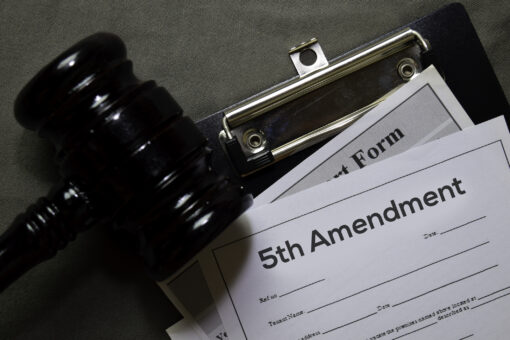
The Fifth Amendment
If a suspect in a criminal inquiry is in police custody and being interrogated, he or she has the right to an attorney under the Fifth Amendment. Many court disputes have been fought about what it means to be “under police custody” or “interrogated.”
A person could be detained by the police while at the station, in the back of a police cruiser, on a street corner, or even in their own home. In most circumstances, the key is that he or she does not feel free to leave due to police actions.
For example, if a police officer stops a person on the street suspected of breaking into a store and removes his or her identification, that individual is not free to leave since a reasonable person would not feel free to leave while the police possessed his or her license. He or she would be regarded “in police custody” and have the right to a lawyer in that situation.
What defines an interrogation is typically less ambiguous, with police questioning a suspect being a clear example. Other sorts of interrogation, such as an officer making statements intended to elicit a response, even if it isn’t strictly a question, may exist.
In a missing child case, for example, an officer saying aloud to another officer, “I bet if that child were found today, the parents would be so delighted they wouldn’t even pursue charges,” may be viewed as interrogation because it was a comment intended to elicit a response from the suspect. If the suspect was also in custody, he or she would be entitled to representation.
The Sixth Amendment
A defendant’s Sixth Amendment right to counsel begins whenever official criminal procedures, such as a preliminary hearing, an indictment, or an arraignment, have begun. A defendant in a criminal case has the right to representation from an attorney at all important phases of the process. If you have been charged with a crime, a criminal defense attorney in Los Angeles can help you through the process.
Making sure you ask for an attorney clearly and absolutely is one of the most important components of your right to an attorney. In a number of cases, courts have concluded that a suspect’s right to counsel does not apply because he did not formally request one.
In fact, the Louisiana Supreme Court recently ruled that a defendant who requested a “lawyer, dawg” could have been requesting a “lawyer dog” (a dog who is also a lawyer), and so his constitutional rights were not infringed when the police did not comply. If you’re being interrogated by the authorities, make careful to say “I want a lawyer” as clearly as possible.
Contact Chambers Law Firm now at 714-760-4088 to speak with a criminal defense attorney if you have been interrogated or questioned about a crime.




